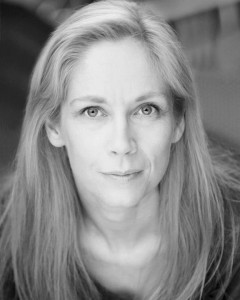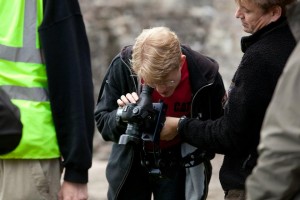When I interviewed Vanessa Bailey and Richard Perryman about their new film, Three Days, we had so much fun and laughed so hard. Vanessa has co-written and is starring in the age gap romance alongside Richard who is fresh out of drama school. Vanessa is beautiful and talented but doesn’t seem to know it, as is Richard. They are both also wonderful company and building quite a following for their film which will start shooting early next year. To find out more, read on….
;
Tell us about your character.

Richard Perryman: ‘I am playing James, a recent graduate, a young guy who does odd jobs. He is flyering for a jazz club and has a care-free lifestyle. He is not really looking for love but just by chance it happens. We were talking about this earlier. It just happens and he is not looking for a long term thing. It just happens to him and he can’t really get away. [laughter]

Vanessa Bailey: [laughing] He can’t really get away! These two characters are not the two people you would expect to see in a relationship. Not just with the age gap, which does sometimes happen, but also with their personalities. She is no a cougar, she is not predatory. She hasn’t been walking around looking for impressionable young leafleters to drag back to her hotel room. He’s not a lad.
;
Richard: It’s not a trophy for him.
;
Vanessa: It is just a sexual connection between them.
;
Richard: Well, not the main one.
;
Vanessa: [laughing] No, not the main one. It is about two real people. It is about finding what that connection would be and how it would work out in real life. They are not caricatures. It is not about romantic cliches. If two people really did connect, how would that work. Can it work?
;
Richard: Can that relationship last or is it just a fling?
;
Vanessa: And we don’t know the answer yet.
;
Richard: I think they are probably both going into it thinking it is just a fling. And not expecting to find that they actually fall in love.

Age gap relationships are popular in film at the moment. Why do you think they are popular and what is your favourite?
Vanessa: I really liked the ITV one, Leaving, although I kinda thought they had stolen our thunder because we had written the script before it came out. What appealed to me about that one, and about Three Days, is most of the other films, the age gape in The Graduate isn’t that big. There is only six-years between them because they are playing up and down. So what I really liked about the ITV one was that they had Helen McCrory who is really gorgeous. They were able to make the audience believe. It was a slightly different story and it was about self-improvement. That one would be my favourite because it was anchored in real life. You can recognise it in real life. Whereas with the other ones, they are lovely stories, but they are not real.
;
Richard: I have only seen The Graduate. I think with that one he has that relationship thrust upon him. It is much darker. She is more of a cougar and she reels him in. This is more of a chance. It is a more filmic story.
;
Vanessa: It is more of a romance. It is not dark in any way. Which is more challenging. There is no gender game. It is more, ‘why has this happened and what should we do with it?’.
;
Why do you think there is still a stigma attached to the older women/younger man thing?
Richard: There has been a rise in those type of films. I think there is a stigma attached but it is becoming less and less. There is still that taboo and it is still fine with older men and younger women.
;
Vanessa: Again, we were talking about that earlier. I think with the older man and younger women, largely they are a physical manifestation of his success and being sexually attractive to women. It is more of a trophy thing. It is interesting because, as you said, the storyline is really popular. We have 1,300 people following us on Twitter. We have no media, no trailer, nothing really about the film, but I think the story has lots of appeal. We have a lot of different people following us. Younger girls, 17 or 18 years old and older men.
;
We had a guy who said when I was in my 20s I had a relationship with a women who was 20 years older than me because it is common. See I am 43.
;
Richard: And I am 22.
;
Vanessa: Oh my god it has gotten bigger! What is that gap?
;
Richard: 21 years.
;
Vanessa: Yes, 21 years. That is quite a big gap.
;
Richard: It’s not that big.
;
Vanessa: Oh, bless you. We can make it work. But I think people are really fascinated by that. I am not going to name names but I had a lot of people say I had this relationship with this women who was 20 years older than me. It is really interesting. It does actually happen but I don’t think film shows that as much as the older guy.
;
Another issue with younger men with older women is the fertility issue….
;
Vanessa: Yes, I think that is true. It doesn’t work quite as well from a family point of view, biologically the other way around. Maybe some women are at the point when they don’t want to have kids.
;
Richard: I think going into that relationship they won’t really think about it and then when they did the pressure would start adding on to it. Like, ‘what do we do?’
;
Vanessa: I was talking to some friends about it and they were like, ‘lucky you’ and then I was thinking, no, because in reality when you are an older women it is hard. You have insecurities.
;
Richard: Yeah, you were saying to me that when we go out people will be like, ‘Your son is waiting for you’ or ‘Is that your mum?’ or something. Which would be really tough.
;
Vanessa: [laughing] There is always a 21-year-old girl around the corner and you are getting older, and you look older, and the point of this, of Three Days, is also when older women are portrayed in films they don’t look their age. They have had all of that plastic surgery and they don’t look their age. I do look my age [she doesn’t] so it is not like, yeah, she is a hot 43 but she looks 33. She is just 43. So there is that whole physical insecurity.

There is also this myth that is spread that men get better looking as they get older but women don’t. It places a lot of pressure on women and it also happens a lot in film. Then when you do get a part it is not a really good part. In this film it is a women in a really good role, which could actually have a lot of significance.
;
Vanessa: And that is the great thing about indie film. You have raised a great point actually and that is the good thing about Three Days. There are not the parts out there that actresses my age necessarily want to play. You get typecast in commercials and then you have to wait until you are 75 to play a dowager in Downton Abbey. There is a massive gap in-between. You are just wandering around wondering what you are going to do. A few of us do have a natural look so you are not going to get the barmaid parts or the cougar parts. So I kind of wanted to come up with a part that a lot of women my age would want to play because it is interesting and it is fun. There is a massive gap for older actresses.
;
How did you come on-board
;
Richard: I didn’t really do anything.
;
Vanessa: That is the joy of Twitter. I am going to write a book. Instead of the Joy of Sex I am going to write The Joy of Twitter, and [to Richard] you are probably too young to even know the book. It was out in the 1970s. [to me] You know the book? [Yes, I know the book] See, women know the book.
;
So, Twitter, we were looking for someone. I was looking at showreels because I love watching showreels. I saw Richard’s headshot and someone tweeted a link to a short film he was in called Emmeline, which was gorgeous. So I stalked him. I asked him to be in a film with me.
;
Richard: I got an email asking me if I wanted to be in the film. We met up for a coffee. Then I wanted to do it. She reeled me in. We were both on the same page in terms of character and what we wanted for the film.
;
Vanessa: What clinched it was that halfway through we were talking about the dialogue and how we wanted it to be really natural, and be very real and he said it should be like ‘Before Sunrise’, which is my favourite film. At that point I was really hoping he wanted to be in the film.
;
So it was the power of Twitter and short film. And the mocha that I bought him that I then drank.
;
Richard: Yeah, I had a latte and she had my mocha.
;
Vanessa: Start as you mean to go on.



Tell us about the process of the film so far.
Vanessa: It has been a long time actually, nearly a year. I wrote it. I wrote a really bad script originally. I sent if to Jon Rennie, our director, and basically what he did was he rewrote it from a cinematic point of view. Jon said he liked the story but this is how he thought the physical journey of the film would go. We have beautiful locations we are filming in. Then he gave it back to me to fill in the dialogue. We knew we had Huw onboard who is just phenomenally good.
;
The film is quite like Notting Hill on acid. Huw Walters (Cinematographer) and Jon and myself all worked on Bubbles [an excellent short film. See it] Our composer had seen Bubbles and asked us if we had a composer. Then I looked at his credits and I was like, wow. He has worked with the BBC, with Tom Jones, with loads of people.
;
Our hair designer, Jason Hall, also asked to come onboard and he had done London Fashion Week. He was also from twitter. He contacted us and asked us if we needed a hair stylist.
;
The producer, Sam Smith-Higgins, was following the film since it started on Facebook and she said she would really like to collaborate and asked if we had a producer. She has an entire production company that she is bringing with her. The Executive Producer, Suzie Boudier, has been a constant source of inspiration.
;
The great thing about this film is that everyone has come on-board because they really want to make this film rather than just a film. It has been a really long process. I am really excited.
;
How did you approach funding.
Vanessa: We will be crowd funding in February. Consolidating everything in March and then we are shooting in April. We are looking at different crowd funding options at the moment.
;
Tell us about you.
;
Richard: I just graduated from E15 from a contemporary theatre course. I set up my own theatre company with a couple of friends called Antler. We took two shows up to Edinburgh.
;
Vanessa: Who have got some amazing reviews. Should I quote some of them? Richard excels in dry humour. That is what it said.
;
Richard: We got some lovely reviews. Since then I have done a short film with the same company. I was lucky to be a part of that. And from that I got this. Which is great and exciting.
;
Vanessa: I am completely different. No training. I am a teacher. A music specialist whatever that means. I came out of it after I had my children and decided I wanted to be an actress. So I did a lot of background work just to get into the scene and I was lucky to break that rule that you never become an actor after being an extra. I managed to get there. I have managed to blag my way to some good jobs so far.
;
You are so self deprecating
Vanessa: Yes I am. But I have no reason to be here. Once I got Spotlight and a DVD I sent it out and Sam [Samantha from Simon & How, out mutual agent] was the first person to give me an audition. I absolutely love it.
;
Do you think the age of the actor is dead and you have to be an actorpreneur and do your own projects.
;
Richard: I have only ever done my own projects. So I think, yes, you can’t really trust anyone else to do anything for you. You have to do it yourself. If you are lucky enough you will be handed lots of jobs. It is the luck of the draw. If not you have to go out and do it yourself. [to Vanessa] Like you are doing.
;
Vanessa: All actors know that it is a really small pool that people fish from. Especially in television. It is hard and it is not going to talent unfortunately. You see people who work regularly who are not good and lots of people who are very talented who don’t get any work. So, yes, I do think you have to be an actorpreneur.
;
Richard: I am very bad at selling myself because I am not on Twitter.
;
I often lose roles to people who are more famous or someone’s girlfriend.
;
Vanessa: Yes, that is frustrating. I can see the other side of that. We all work with people we know because it is better the devil you know.
;
Richard: Then that creates those little cliques who work with the same people and you can’t break into it.
;
That is why I left Scotland. I had to commute from Glasgow to London because there was the group of Scottish actors who always got work and I could not break into the industry.
;
Vanessa: There are a couple of casting directors who fight it. A casting director said to me that he was sick of seeing the same faces in television over and over again.
;
And you do. You see the same faces over and over again. We need pioneers who are bringing new faces in and trying to get people seen.
;
Richard: But we are a little family. [We all have the same agent. Samantha at Simon & How]
;
That’s right.
So is the process to make a short and then a feature film.
;
Vanessa: I would love to. I would love to make a feature. Are you playing footsie with me Richard?
;
Richard: Yes, I am getting into character.
;
Vanessa: Two things with the short film. Firstly, I would like it to get into festivals. But also it is like a calling card. Hopefully people will see this. When we had one of our first meetings with Jon and Huw you could very much see the potential of the film and the ensemble cast. I would love to make a feature film.
;
Richard: It has the potential to be a great British film.
;
Vanessa: I am such a champion of British film so I would love to make it into a feature.
;
What are you shooting on?
;
Vanessa: I’m not sure. I have left that to Jon. Not film. Because it is too expensive. We want to do a few different takes on this film and we don’t want to worry about how expensive it would be. I know Jon was talking about filming on mono. So a combination I think.
;
What’s next?
;
Richard: I just graduated. I am not sure what is next. I am just putting myself out there.
;
Vanessa: You are developing….
;
Richard: Oh yeah, with my company, Antler, we are constantly developing work. Putting things together and trying out new ideas.
;
Vanessa: Everything at the moment is Three Days. Then hopefully after that it will be the festivals. [Vanessa also has a lot of acting work coming up. Including a part in Southcliffe and some short films]
;
Thanks Vanessa and Richard.
;
Director: Jon Rennie @jon_rennie
Writers: Vanessa Bailey, Jon Rennie @vbaileyactor @jon_rennie
Producer: Sam Smith-Higgins http://www.redbeetlefilms.co.uk/ @SamSmith-Higgins
Executive Producer: Suzie Boudier @Superboooo
Cinematographer: Huw Walters http://vimeo.com/user4428776 @huwcamera
Composer: William Goodchild http://www.williamgoodchild.com/ @WGoodchildMusic
PR: FireflyPR http://www.firefly-pr.com/ @FireflyPR
Hair Design: Jason Hall http://www.jasonhallhairdressing.co.uk/ @Jhhair










